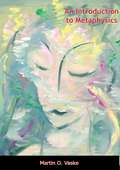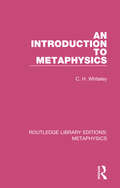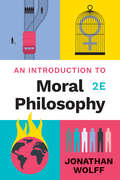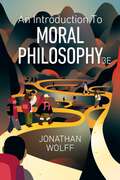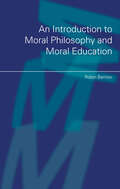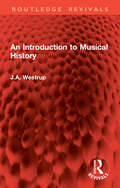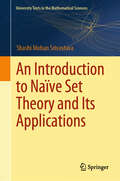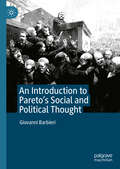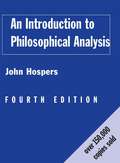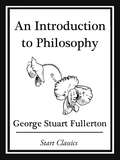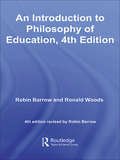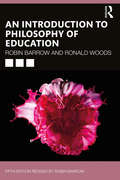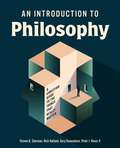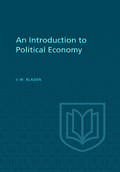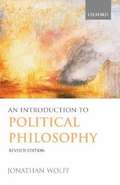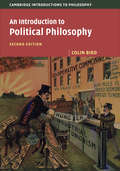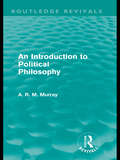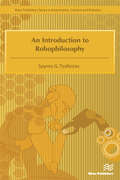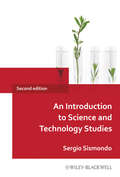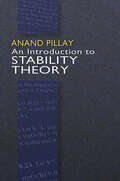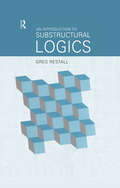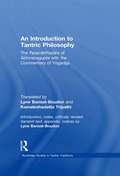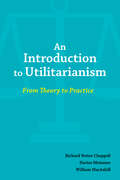- Table View
- List View
An Introduction to Metaphysics
by Martin O. VaskeA clear, solid and succinct textbook in metaphysics, An Introduction to Metaphysics, which was first published in 1963, begins with a chapter on the existence of all things (including ourselves) and then proceeds to discuss the subjects of changing existents; participating, multiple existents; efficient causes; final and exemplary causes; the Primary Cause; the transcendental properties; categories of limited being; and the analogy of being.
An Introduction to Metaphysics (Routledge Library Editions: Metaphysics #10)
by C. H. WhiteleyOriginally published in 1950. For those interested in the fundamental problems of philosophy but not familiar with its technicalities, this book introduces the main type of theory in metaphysics, not by a catalogue of philosophers’ opinions but by a continuous train of reasoning. The central theme is the problem of the relation between Mind and Matter, and in the course of the argument there are discussions of mechanistic materialism, of idealism and our knowledge of the external world, and of the arguments for the existence of God. The problems are presented lucidly but without over-simplification.
An Introduction to Moral Philosophy (Second Edition)
by Jonathan WolffThe most contemporary and applicable introduction to moral philosophy From respected philosopher and writer Jonathan Wolff, this brief introduction to ethics stimulates independent thought, emphasizes real-world examples, and provides clear and engaging introductions to key moral theories and the thinkers behind them. The new Second Edition offers expanded coverage of moral reasoning, as well as two thoughtful and contemporary new chapters on applying moral philosophy and the ethics of race. A companion primary source collection, Readings in Moral Philosophy, amplifies issues discussed in the text, connecting them to problems in applied ethics.
An Introduction to Moral Philosophy (Third Edition)
by Jonathan WolffEmpower students to think critically about ethical theories and moral dilemmas. From his influential scholarship to his popular writings to his appearances on the BBC, Jonathan Wolff has a knack for making moral philosophy vivid and exciting for any audience. In An Introduction to Moral Philosophy, he wields this talent to deliver a text that students enjoy reading. In addition to surveying the basics of ethical theory and critical thinking, Wolff guides students through debates about some of today’s most urgent moral issues, including the ethics of race, gender, artificial intelligence, and public health. The text invites students to think for themselves about real-world issues and provides them with an accurate, appealing sense of what moral philosophy is all about. This purchase offers access to the digital ebook only.
An Introduction to Moral Philosophy and Moral Education
by Robin BarrowThis book presents and argues for a moral theory which draws on most of the major theoretical positions to some degree, but it also spells out the limits and boundaries of a moral theory. In doing so, it exposes a number of common confusions and misunderstandings about morality, and presents a strong argument for some indisputable truths in relation to the moral sphere. Divided into four parts, the book covers the key issues within moral philosophy: part one provides a lucid and powerful account of the nature and limits of moral theory, sharply distinguishing it from religion part two outlines a positive moral theory by exploring the defining principles of morality and the reasons for being moral part three distinguishes moral values from others such as ecological, health and safety and sexual values part four is concerned with the implications of our moral understanding for moral education. While this book concentrates on argument and ideas, a commentary to each chapter provides historical context and contemporary reference points. It will prove an invaluable resource for students of both Education and Philosophy.
An Introduction to Musical History (Routledge Revivals)
by J.A. WestrupFirst published in 1955, An Introduction to Musical History is not just another short history of music, but a discussion of its sources and background. It explains how we derive our knowledge of the music of the past, and how music has been affected by its social and political background. Such topics as the influence of language and racial characteristics find their place here, as well as the contributions made by literature and painting. Some of the problems presented by musical history are examined, and an indication is given of the best method of studying it. This book will be an interesting read for students and researchers of music.
An Introduction to Naïve Set Theory and Its Applications (University Texts in the Mathematical Sciences)
by Shashi Mohan SrivastavaPrimarily designed for graduate students of mathematics, this textbook delves into Naïve set theory, offering valuable insights for senior undergraduate students and researchers specializing in set theory. Commencing with a comprehensive exploration of functions and relations, the book extends its coverage to various applications of Naïve set theory across multiple mathematical branches, including real analysis, linear and abstract algebra, general topology, and introductory aspects of complex analysis and measure theory. The text meticulously introduces cardinal and ordinal numbers, along with transfinite induction, following the natural progression discovered by Cantor during his examination of trigonometric series. While this book provides a solid foundation, students intrigued by set theory for its intrinsic value should recognize that the subject extends far beyond the scope of this text.
An Introduction to Non-Classical Logic
by Graham PriestThis revised and considerably expanded 2nd edition, published in 2008, brings together a wide range of topics, including modal, tense, conditional, intuitionist, many-valued, paraconsistent, relevant, and fuzzy logics. Part 1, on propositional logic, is the old Introduction, but contains much new material. Part 2 is entirely new, and covers quantification and identity for all the logics in Part 1. The material is unified by the underlying theme of world semantics. All of the topics are explained clearly using devices such as tableau proofs, and their relation to current philosophical issues and debates are discussed. Students with a basic understanding of classical logic will find this book an invaluable introduction to an area that has become of central importance in both logic and philosophy. It will also interest people working in mathematics and computer science who wish to know about the area.
An Introduction to Pareto's Social and Political Thought
by Giovanni BarbieriThis book analyses Pareto&’s social and political thought a hundred years after his death, showing how the structure of the scholar&’s works is generally quite clear (contrary to what is commonly presumed), and how the maintenance of the social and political systems&’ equilibrium represents Pareto&’s main research focus . In particular, the aim of this book is to demonstrate how the author considers the &‘right middle path&’ – in the social, economic, and political arenas – as the only way capable of ensuring social cohesion. The book will be of interest to scholars and researchers of sociology, sociological and political theory, and political science.
An Introduction to Philosophical Analysis
by John HospersJohn Hospers' Introduction to Philosophical Analysis has sold over 150,000 copies since its first publication. This new edition ensures that its success will continue into the twenty-first century. It remains the most accessible and authoritative introduction to philosophy available using the full power of the problem-based approach to the area to ensure that philosophy is not simply taught to students but practised by them.The most significant change to this edition is to respond to criticisms regarding the omission in the third edition of the famous opening chapter. A brand new chapter, Words and the World, replaces this in the fourth edition - which now features a large number of examples and illustrative dialogues. The rest of the text has been thoroughly revised and updated to take account of recent developments in some areas of philosophy.
An Introduction to Philosophy
by George Stuart FullertonThis anthology is a thorough introduction to classic literature for those who have not yet experienced these literary masterworks. For those who have known and loved these works in the past, this is an invitation to reunite with old friends in a fresh new format. From Shakespeare s finesse to Oscar Wilde s wit, this unique collection brings together works as diverse and influential as The Pilgrim s Progress and Othello. As an anthology that invites readers to immerse themselves in the masterpieces of the literary giants, it is must-have addition to any library
An Introduction to Philosophy of Education
by Robin Barrow Ronald WoodsThis introductory text, now in its fourth edition, is a classic in its field. It shows, first and foremost, the importance of philosophy in educational debate and as a background to any practical activity such as teaching. What is involved in the idea of educating a person or the idea of educational success? What are the criteria for establishing the optimum balance between formal and informal teaching techniques? How trustworthy is educational research? In addition to these questions, which strike to the heart of the rationale for the educative process as a whole, the authors explore such concepts as culture, creativity, autonomy, indoctrination, needs, interests and learning by discovery. In this new updated edition, the authors draw on the latest research in genetics to argue that education is uniquely human and is essentially what develops us as humans. Resisting modern tendencies to equate knowledge with opinion, and value judgements with taste, this book leads the reader into the business of philosophising and champions the cause of reason in education.
An Introduction to Philosophy of Education
by Robin Barrow Ronald WoodsThis introductory text, now in its fifth edition, is a classic in its field. It shows, first and foremost, the importance of philosophy in educational debate and as a background to any practical activity such as teaching. What is involved in the idea of educating a person or the idea of educational success? What are the criteria for establishing the optimum balance between formal and informal teaching techniques? How trustworthy is educational research? In addition to these questions, which strike to the heart of the rationale for the educative process as a whole, the authors explore such concepts as culture, creativity, autonomy, indoctrination, needs, interests, and learning by discovery. Updates to this edition include new chapters on religious education and moral education, as well as questions for reflection at the end of each chapter.
An Introduction to Philosophy: A Christian Guide to the Things that Really Matter
by Steven B. Sherman Richard A. Holland Gary S. Osmundsen Peter J. RasorDesigned for students in Christian colleges and seminaries, An Introduction to Philosophy surveys the four main areas of philosophy - logic, metaphysics, epistemology, and ethics - in an accessible and engaging manner. Yet it also covers important topics sometimes left unaddressed in introductions, including:why philosophy matters in our daycritical thinking and intellectual virtuea brief history of philosophyphilosophical hermeneuticsthe relationship between philosophy, faith, and worldviewreligious epistemologybioethics, sexual ethics, other types of ethicsa Christian philosophy of lifeGrounded in the Christian intellectual tradition, each chapter in An Introduction to Philosophy includes student-friendly features such as chapter summaries, explanatory sidebars, reflection questions, vocabulary words and definitions, and suggestions for further reading. Professors and students will find it to be a broad and useful overview, perfect for undergraduate and seminary students alike.
An Introduction to Political Economy
by Vincent BladenNewly revised by the author (1956), this text-book for beginning students is also designed for general readers who want to know what economics is and how economists think. It analyses the size and composition of the wage-earner in modern industry, Canadian public policy in relation to combines, and the the social problems of the special problems of the Canadian wheat-growing and newsprint industries. "...an interesting, instructive, and valuable book full of essential information."
An Introduction to Political Philosophy
by Jonathan WolffThe revised edition of this highly successful text provides a clear and accessible introduction to some of the most important questions of political philosophy. Organized around major issues, Wolff provides the structure that beginners need, while also introducing some distinctive ideas of his own.
An Introduction to Political Philosophy (Cambridge Introductions to Philosophy)
by Colin BirdNow revised and updated and containing several entirely new chapters, this book provides a comprehensive introduction to political philosophy. It discusses historical and contemporary figures and covers a vast range of topics and debates, including immigration, war, national and global economics, the ethical and political implications of climate change, and the persistence of racial oppression and injustice. It also presents accessible, non-technical discussions of perfectionism, utilitarianism, theories of the social contract, and the Marxian tradition of social criticism. Real-life examples introduce students to ways of using philosophical reflection and debates, and open up new perspectives on politics and political issues. Throughout, this book challenges readers to think critically about political arguments and institutions that they might otherwise take for granted. It will be a vital and provocative resource for any student of philosophy or political science.
An Introduction to Political Philosophy (Routledge Revivals)
by A. R. MurrayFirst published in 1953, this seminal introduction to political philosophy is intended for both the student of political theory and for the general reader. After an introduction which explains the nature and purpose of philosophy, Dr Murray provides a critical examination of the principle theories advanced by political philosophers from Plato to Marx, paying special attention to contemporary issues. The book also makes an attempt to define the essential issues of philosophical significance in contemporary politics, with special reference to the conflict between political authority and individual rights, and to show how the different moral assumptions underlying authoritarian and democratic systems of government are ultimately based upon different theories of logic.
An Introduction to Probability and Inductive Logic
by Ian HackingThis is an introductory textbook on probability and induction written by one of the world's foremost philosophers of science. The book has been designed to offer maximal accessibility to the widest range of students (not only those majoring in philosophy) and assumes no formal training in elementary symbolic logic. It offers a comprehensive course covering all basic definitions of induction and probability, and considers such topics as decision theory, Bayesianism, frequency ideas, and the philosophical problem of induction. The key features of the book are: * A lively and vigorous prose style* Lucid and systematic organization and presentation of the ideas* Many practical applications* A rich supply of exercises drawing on examples from such fields as psychology, ecology, economics, bioethics, engineering, and political science* Numerous brief historical accounts of how fundamental ideas of probability and induction developed. * A full bibliography of further reading Although designed primarily for courses in philosophy, the book could certainly be read and enjoyed by those in the social sciences (particularly psychology, economics, political science and sociology) or medical sciences such as epidemiology seeking a reader-friendly account of the basic ideas of probability and induction. Ian Hacking is University Professor, University of Toronto. He is Fellow of the Royal Society of Canada, Fellow of the British Academy, and Fellow of the American Academy of Arts and Sciences. he is author of many books including five previous books with Cambridge (The Logic of Statistical Inference, Why Does Language Matter to Philosophy?, The Emergence of Probability, Representing and Intervening, and The Taming of Chance).
An Introduction to Robophilosophy Cognition, Intelligence, Autonomy, Consciousness, Conscience, and Ethics: Cognition, Intelligence, Autonomy, Consciousness, Conscience And Ethics (River Publishers Series In Automation, Control, And Robotics Is A Series Of Comprehensive Academic And Professional Books Which Focus On The Theory And Applications Of Automation, Control And Robotics. The Series Focuses On Topics Ranging From The Theory And Use Of Control Systems, Automation Engineering, Robotics And Intelligent Machines. Books Published In The Series Include Research Monographs,)
by Spyros G. TzafestasModern robots have arrived at a very matured state both in their mechanical / control aspects and their mental aspects. An Introduction to Robophilosophy explores the philosophical questions that arise in the development, creation, and use of mental – anthropomorphic and zoomorphic- robots that are capable of semiautonomous / autonomous operation, decision making and human-like action, being able to socially interact with humans and exhibit behavior similar to human beings or animals. Coverage first presents fundamental concepts, and an overview of philosophy, philosophy of science, and philosophy of technology. The six principal mental capabilities of modern robots, namely cognition, intelligence, autonomy, consciousness, conscience, and ethics are then studied from a philosophical point of view. They actually represent the product of technological embodiment of cognitive features to robots. Overall, readers are provided a consolidated thorough investigation of the philosophical aspects of these mental capabilities when embedded to robots. This book will serve as an ideal educational source in engineering and robotics courses as well as an introductory reference for researchers in the field of robotics, and it includes a rich bibliography.
An Introduction to Science and Technology Studies
by Sergio SismondoAn Introduction to Science and Technology Studies, Second Edition reflects the latest advances in the field while continuing to provide students with a road map to the complex interdisciplinary terrain of science and technology studies. Distinctive in its attention to both the underlying philosophical and sociological aspects of science and technologyExplores core topics such as realism and social construction, discourse and rhetoric, objectivity, and the public understanding of science Includes numerous empirical studies and illustrative examples to elucidate the topics discussedNow includes new material on political economies of scientific and technological knowledge, and democratizing technical decisionsOther features of the new edition include improved readability, updated references, chapter reorganization, and more material on medicine and technology
An Introduction to Stability Theory (Dover Books on Mathematics)
by Anand PillayThis introductory treatment covers the basic concepts and machinery of stability theory. Lemmas, corollaries, proofs, and notes assist readers in working through and understanding the material and applications. Full of examples, theorems, propositions, and problems, it is suitable for graduate students in logic and mathematics, professional mathematicians, and computer scientists. Chapter 1 introduces the notions of definable type, heir, and coheir. A discussion of stability and order follows, along with definitions of forking that follow the approach of Lascar and Poizat, plus a consideration of forking and the definability of types. Subsequent chapters examine superstability, dividing and ranks, the relation between types and sets of indiscernibles, and further properties of stable theories. The text concludes with proofs of the theorems of Morley and Baldwin-Lachlan and an extension of dimension theory that incorporates orthogonality of types in addition to regular types.
An Introduction to Substructural Logics
by Greg RestallThis book introduces an important group of logics that have come to be known under the umbrella term 'susbstructural'. Substructural logics have independently led to significant developments in philosophy, computing and linguistics. An Introduction to Substrucural Logics is the first book to systematically survey the new results and the significant impact that this class of logics has had on a wide range of fields.The following topics are covered:* Proof Theory* Propositional Structures* Frames* Decidability* CodaBoth students and professors of philosophy, computing, linguistics, and mathematics will find this to be an important addition to their reading.
An Introduction to Tantric Philosophy: The Paramarthasara of Abhinavagupta with the Commentary of Yogaraja (Routledge Studies in Tantric Traditions)
by Lyne Bansat-Boudon Kamalesha Datta TripathiThe Paramārthasāra, or ‘Essence of Ultimate Reality’, is a work of the Kashmirian polymath Abhinavagupta (tenth–eleventh centuries). It is a brief treatise in which the author outlines the doctrine of which he is a notable exponent, namely nondualistic Śaivism, which he designates in his works as the Trika, or ‘Triad’ of three principles: Śiva, Śakti and the embodied soul (nara). The main interest of the Paramārthasāra is not only that it serves as an introduction to the established doctrine of a tradition, but also advances the notion of jiv̄anmukti, ‘liberation in this life’, as its core theme. Further, it does not confine itself to an exposition of the doctrine as such but at times hints at a second sense lying beneath the evident sense, namely esoteric techniques and practices that are at the heart of the philosophical discourse. Its commentator, Yogarāja (eleventh century), excels in detecting and clarifying those various levels of meaning. An Introduction to Tantric Philosophy presents, along with a critically revised Sanskrit text, the first annotated English translation of both Abhinavagupta’s Paramārthasāra and Yogarāja’s commentary. This book will be of interest to Indologists, as well as to specialists and students of Religion, Tantric studies and Philosophy.
An Introduction to Utilitarianism: From Theory to Practice
by William MacAskill Prof. Richard Chappell Mr. Darius MeissnerAn Introduction to Utilitarianism: From Theory to Practice is a state-of-the-art text, simultaneously accessible to introductory students and informative for more advanced readers. Two key features set it apart. First, its comprehensive coverage of the arguments for and against utilitarianism is unparalleled. Second, it takes seriously the practical implications of utilitarianism for how we should live, with a particular emphasis on utilitarianism's impartial beneficence and its focus on effectiveness. Guided by the conviction that practical ethics is more about how best to use our limited time and resources than which victims to hit with trolleys in thought experiments, its practical upshots should prove amenable to utilitarians and non-utilitarians alike.
